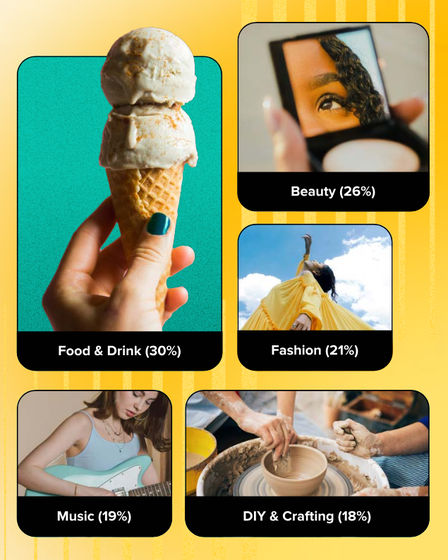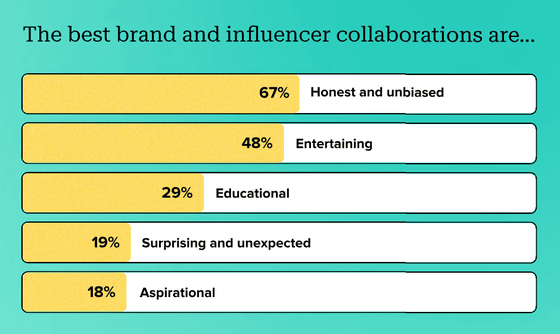New survey reveals Gen Z cares little if influencers are real people

A new research report on influencer marketing published by analytics company
What consumers want from influencer marketing
(PDF file) https://brandfolder.sproutsocial.com/VXTUTVL1/at/5pbs9v7p6g4kksf3n6p6ckz/influencer-marketing-report_2024_consumer-expectations.pdf
Influencer Marketing | Success | Sprout Social
https://sproutsocial.com/insights/data/influencer-marketing-report/success/
Gen Z mostly doesn't care if influencers are actual humans, new study shows | Mashable
https://mashable.com/article/gen-z-ai-influencers
The research report, published by Sprout Social, is the result of a survey of 2,000 Americans and British adults.
The first survey question was about 'Qualities consumers look for in an influencer.' The most sought-after qualities were, in order, 'fits my values' (53%), 'trustworthy even when posting sponsored content' (47%), 'posts the right amount of content' (37%), 'fits my personal attributes' (36%), and 'number of followers' (26%).

Many consumers responded that they support influencers who 'align with their values,' and this trend seems to apply to a wide range of generations, including
On the other hand, only 35% of young people in Gen Z support the factor of 'matching my values,' with more people (47%) placing importance on the 'number of followers' on a social media account.
Regarding this result, Sprout Social wrote, 'It seems that discerning Gen Z young people tend not to trust the word 'authenticity' at face value. Gen Z tends to place more importance on quantitative credibility (number of social media followers) than on the word 'authenticity.''
In addition, 27% of respondents overall said that marketing using AI influencers would make them 'disinterested,' 37% said that it would make them 'more interested in brands,' and 37% said that it would make them 'more distrustful of brands.' On the other hand, 46% of Gen Z said that it would make them 'more interested in brands,' revealing that they are less resistant to AI influencers than other generations.
Introducing the AI model 'Aitana' that earns over 1.6 million yen a month, a popular model who also receives date invitations from celebrities - GIGAZINE

The most popular influencer marketing topic among consumers is 'Food & Drink' (30%), followed by 'Beauty' (26%), 'Fashion' (21%), 'Music' (19%), and 'DIY & Crafting' (18%).

When broken down by generation, topics such as 'fitness,' 'gaming,' and 'lifestyle' are popular among younger generations, while topics such as 'movies,' 'TV,' and 'sports' are popular among Gen Xers, showing that the topics preferred by each generation differ.
The types of influencer content that consumers want are, in descending order, 'honest and unbiased' (67%), 'entertaining' (48%), 'educational' (29%), 'surprising and unexpected' (19%), and 'aspirational' (18%). Regardless of age or gender, it has become clear that honest and unbiased influencer content attracts consumers' attention, but it has also been found that aspirational content does not attract much interest from consumers.

It also became clear that the social media platforms people use most often vary by generation: 50% of Baby Boomers said that Facebook is their most used social media platform, while Gen X and Millennials are about twice as likely to use Instagram as Baby Boomers.
Among the youngest Gen Z members, more than a quarter (27%) cited TikTok as their most used social media platform, clearly showing how preferred platforms differ between generations.
Related Posts:
in Note, Posted by logu_ii







